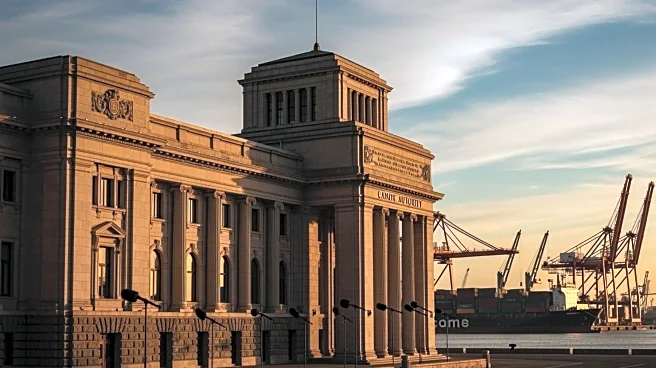What's Happening?
The American Association of Port Authorities (AAPA) has expressed strong opposition to the recent revisions proposed by the U.S. Trade Representative (USTR) regarding tariffs on Chinese-manufactured cargo handling equipment. These tariffs, which include
a 100 percent fee on ship-to-shore cranes and a proposed 150 percent tariff on other equipment such as gantry cranes and terminal tractors, are seen as detrimental to U.S. port modernization and expansion efforts. AAPA argues that these tariffs will delay growth and modernization plans for American ports, as they effectively price out essential equipment types. The association is advocating for the Trump administration to reverse these tariffs and instead support domestic manufacturing through targeted tax credits and funding for port infrastructure.
Why It's Important?
The imposition of high tariffs on cargo handling equipment from China has significant implications for the U.S. maritime industry. Ports are critical infrastructure for national and economic security, and delays in modernization could hinder their competitiveness globally. The tariffs could lead to increased costs for ports, which may have to cut expenses in other areas such as workforce training or capital investment. This situation underscores the need for a balanced trade policy that supports domestic manufacturing while ensuring ports can access necessary equipment without prohibitive costs. The AAPA's call for reversing these tariffs highlights the broader economic impact on the maritime sector and the importance of strategic policy decisions in maintaining U.S. port competitiveness.
What's Next?
The USTR is currently accepting comments on the proposed changes to the fee program until November 12, with the goal of finalizing the tariffs by December 2025. Stakeholders, including port authorities and industry representatives, are expected to provide feedback on the potential economic impacts and suggest alternatives to the current tariff strategy. The AAPA is likely to continue its advocacy for policy changes that support domestic manufacturing and infrastructure development. The outcome of this consultation process could influence future trade policies and the direction of U.S. port development.
Beyond the Headlines
The tariffs on Chinese-manufactured equipment raise concerns about the broader implications for U.S.-China trade relations and the strategic importance of the maritime industry. The focus on reshoring manufacturing highlights the ongoing debate about economic nationalism and the balance between global trade and domestic production. Additionally, the potential for reduced investment in port infrastructure could have long-term effects on the efficiency and capacity of U.S. ports, impacting supply chains and trade flows.















